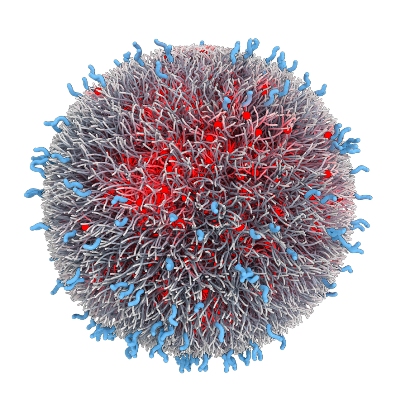Ongoing Phase I clinical trials of targeted therapeutic nanoparticles developed for delivering docetaxel, an anti-cancer drug for treating breast, prostate, lung and other cancers, have demonstrated positive results.
 An artist's rendering of BIND-014. (Image: Digizyme, Inc.)
An artist's rendering of BIND-014. (Image: Digizyme, Inc.)
These targeted nanoparticles called as BIND-014 can accumulate directly in the tumor site by evading healthy cells. They are the first-of-its-kind particles to reach human clinical studies. They are made of FDA-approved biodegradable polymers and their homing molecule makes them to selectively target cancer cells. Scientists at Brigham and Women’s Hospital and MIT originally designed the nanoparticles.
BIND Biosciences, a biopharmaceutical company, conducted the Phase I clinical trial. Robert Langer, the David H. Koch Institute Professor at MIT, and Omid Farokhzad, an Associate Professor at Harvard Medical School and Director of the Laboratory of Nanomedicine and Biomaterials at Brigham and Women’s Hospital, co-founded the company in 2007.
For the Phase I clinical study, BIND-014 nanoparticles were coated with targeting molecules capable of identifying prostate-specific membrane antigen (PSMA), a protein present in large amounts on the surface of prostate cancer cells and other cancers. These nanoparticles feature three components, of which one acts as the drug carrier, the second targets PSMA, and the third evades macrophages and other cells of the immune system.
Seventeen patients, who were treated for metastatic or advanced tumors using conventional chemotherapy, had participated in the Phase I clinical study. In the study, the researchers demonstrated BIND-014’s ability to target PSMA and concentrate at tumor sites. Hitherto, dosages of BIND-014 have achieved the concentration of docetaxel normally delivered through conventional methods, without any new side effects and with very minimal side effects of docetaxel. The study results also demonstrated the effectiveness and safety of the nanoparticles. The BIND-014 treatment effectively reduced the size of the tumors in most of the patients even at lower doses of docetaxel.
BIND-014 demonstrated its efficacy in cancers wherein the effect of docetaxel is low such as cancer of the bile ducts and cervical cancer. The Phase I clinical trial is continuing for dose escalation study to find the safe dose. BIND Biosciences now plans for Phase II trials to assess the efficacy of the BIND-014 treatment in several patients. The study results have been reported in the journal, Science Translational Medicine.
Source: http://web.mit.edu